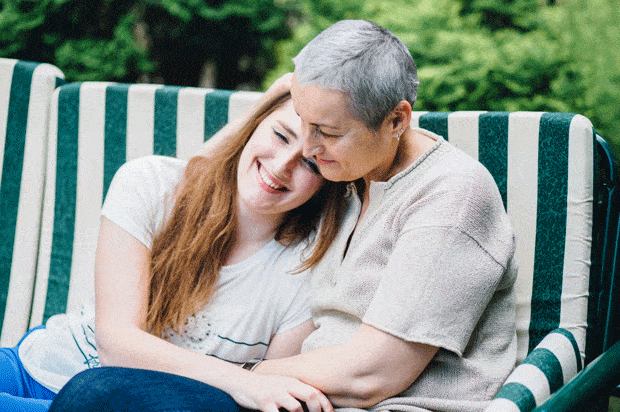Dealing with important days after someone’s died
Losing someone you care about is never easy, and it can be particularly difficult on certain days - for example, a birthday or the anniversary of their death. The Mix spoke to Victoria McCormick, 23, who lost her dad as a teenager, from the Youth Advisory Group at Cruse Bereavement Care.

Try and talk to loved ones about how you're feeling.
Bereavement is really hard. If you’ve ever experienced the heartbreak of losing a family member or friend, you may know the grieving process can take some time and every person works through it in their own way.
There are some times throughout the year where having lost someone can be even more difficult to process. Events such as birthdays, Christmas, Mother’s Day or Father’s Day can be upsetting and you might not know how to deal with them.
That’s ok, we’re here to support you.
Coping with loss and bereavement
The thought of spending your birthday, Christmas, or even Valentine’s Day without a loved one you’ve lost can be gut-wrenching. You might feel like you’ll never be able to celebrate those days again whilst you’re going through bereavement, either because it’ll be too hard without them or you’ll feel guilty if you’re happy.
“It can be strange as you don’t know how to act or what traditions to continue with,” Victoria says. She thought, “Who would sit in Dad’s seat at the dinner table? Or would we keep it empty and have that strange sense of ‘something is missing’ all day?”
There are lots of ‘what ifs’ that you might have to work through on these anniversaries. “The days do get easier,” says Victoria, “but it’s not because you miss them any less, it’s just that you learn how to deal with the pain.”
But if they don’t get easier, that’s ok. Just take each year as it comes and allow yourself to feel however you need to feel, and accept any support if you need it.
The grieving process
If someone you care about has died, you’ll inevitably feel very sad. But you might not know when the sadness will end, or how you’re supposed to feel whilst you go through bereavement.
Victoria insists that there are no set rules for grieving. “Everybody reacts and copes in their own way, it’s a completely individual process,” she says. However you feel about these days is completely valid. You might feel:
- Sad
- Angry
- Nostalgic
- Just plain old excited that it’s Christmas again.
The best thing to do is recognise how you’re feeling and acknowledge that as being ok. Even if you have to say to yourself out loud “I feel like utter crap”, that’s fine. Say it to Snapchat with a dog filter if you need to. Then, once you know how you’re feeling, you can act on it in whichever way is best for you.
How can I spend those tough days during bereavement?
It’s totally up to you. You might have to follow your family’s plans on the day, but try and have a conversation with them beforehand so you’re all on the same page.
It could be a good chance to get together and celebrate the person’s life, or you could always do something totally different to distract you, like hang out with friends.
“In the early days, I really tried to avoid anniversaries,” she admits, “but now I tend to do something with my mum and enjoy the day. This Father’s Day I will be going out for dinner after work with my mum, and we can remember Dad together.”
But if you’re not up for celebrating, you can just wallow with pizza and Netflix. That’s ok too.
How can I talk to my family about my grief?
“These things can be very difficult,” Victoria says, “as you don’t want to burden your family.” But remember that your family will care about how you’re feeling.
“Most of the time, everybody is trying to bottle up their emotions to save other people hurting, so you’re probably not alone,” says Victoria. You don’t have to try and look tough by hiding your emotions. By speaking up about your feelings, it could allow others to feel comfortable sharing too.
But if you find it hard talking, then write your feelings down either in a diary for yourself or on a piece of paper for your family, friends, or GP/counsellor. Be sure to hand this over or talk about your feelings in a comfortable space where emotions aren’t high, like when you’re watching TV together or taking a walk.
How to support family and friends through grief
It can be hard to watch a family member or friend cope with grief, as you know you can’t fix anything.
“Everybody copes differently, so it’s important to gauge how your friend is dealing with the loss and an upcoming anniversary,” Victoria says. “I wouldn’t try to force help upon them, but it’s helpful to make them aware you’re always there if they need you.”
You don’t have to try and make them feel better. Victoria adds: “Just chatting to them about how they’re feeling and letting them talk about their loved one can really help them cope. Even offering to meet for a coffee and just keeping them busy can help, without pressuring them into opening up.”
If you need more support with bereavement, Cruse Bereavement Care offers support via their helpline (0808 808 1677), email, or face-to-face. They also run Hope Again, a support website created for and by young people who have been bereaved. You can also:
- Visit your GP for mental health support
- Speak to our team at The Mix
- Speak to Childline if you’re under 19
Next Steps
- Cruse offers grief and bereavement support via phone, email, and face-to-face. You can call their free helpline on 0808 808 1677 (Monday - Friday, 9.30 - 5pm, extended to 8pm on Tuesdays, Wednesdays, and Thursdays) or visit their website for more support.
- Marie Curie offers emotional support and practical information for anyone affected by terminal illness, and their friends and families. Call Marie Curie's helpline on 0800 090 2309 from 8am to 6pm Monday to Friday and 11am to 5pm Saturday.
- Hope Again is a website created for young people by young people affected by bereavement. It offers a community of peer support, as well as a support service via email: [email protected]
- You can talk to Childline about anything. Call them for free on 0800 1111 or visit their website.
- Chat about this subject on our Discussion Boards.
By Holly Turner
Updated on 01-Apr-2021
No featured article










